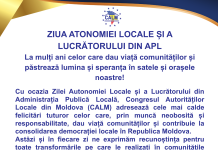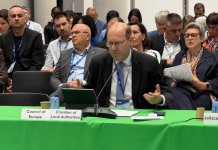The Moldovan government has told members of the European Committee of the Regions (CoR) that it is determined to decentralise powers and strengthen the administrative capacity of local and regional authorities as part of its reforms in preparation for the country’s potential accession of the European Union.
Speaking at a plenary session with the EU’s assembly for local and regional politicians on 15 May, Cristina Gherasimov, Moldova’s Deputy Prime Minister for European Integration, said that on 14 May the Moldovan government adopted a roadmap for reform of public administration, following consultation with the EU and other stakeholders, “most importantly” local authorities.
Deputy Prime Minister Gherasimov said that the government would also like to see the CoR and Moldovan local and regional authorities work more closely together, through the creation of a Joint Consultative Committee with a fixed membership and work programme. The CoR supports the proposal, but a decision rests with EU Member States. The CoR recently created a more informal forum for discussion and cooperation, a working group, which will meet for the first time on 27 May. The objective is to support Moldovan sub-national authorities as they prepare for EU membership.
The deputy prime minister warned, though, that Moldova in September faces parliamentary elections that “will be decisive for the continuation of Moldova’s European reform agenda”, adding that the campaign for presidential elections in autumn 2024 had been marred by “disinformation campaigns, including about the EU, cyber-attacks and documented attempts to interfere in democratic processes”.
In an opinion on Moldova’s EU-related reforms adopted in April, CoR members praised Moldova’s alignment with the EU’s foreign and security policy, supported its ongoing reforms of local government, and highlighted the challenges of disinformation, among others.
During their debate with Deputy Prime Minister Gherasimov, CoR members expressed strong support for Moldova’s accession – possibly by 2030 – and underscored the importance of focusing on local and regional issues also as a means of increasing public support for the EU. In a referendum in October 2024, Moldovans voted to anchor Moldova’s EU aspirations in the constitution, but the result was close. They also highlighted a range of themes including the importance of the European Green Deal given Moldova’s vulnerability to climate change.
The EU in February agreed a Reform and Growth Facility for Moldova worth EUR 1.9 billion, the largest financial package that Moldova has received from the EU. The money is being spent on major infrastructure projects, but also on social infrastructure, such as hospitals and schools, as well as to support reforms. The CoR has stressed the need for the central government to involve local and regional authorities in the country’s EU-related Growth Plan.
Moldova applied for EU membership in March 2022, obtained candidacy status in June 2022, and started formal accession negotiations in June 2024. The EU and Moldova are currently going through a ‘screening process’, to assess where Moldova’s legislation needs further alignment with European legislation.
The debate can be re-watched on the website of the European Committee of the Regions.
Quotes:
Cristina Gherasimov, Moldova’s Deputy Prime Minister for European Integration: “We appreciate the Committee’s continued engagement and concur that local and regional authorities must be part of this process. Their capacity to deliver services, maintain social cohesion and respond to citizens’ needs is critical to ensure that on our path towards EU membership nobody is left behind.”
Mariana Gâju (RO/PES), mayor of Cumpăna and chair of the CoR’s Working Group on Moldova: “For integration to be real and sustainable, we must understand the profound impact this process has on local authorities in Moldova — the true drivers of reform on the ground. Without local administrative capacity, European funds remain just lines on paper. And without genuine local autonomy, democracy risks remaining a narrative without substance. That is why we call on the European Commission and development partners to intensify their direct support for local public authorities in the Republic of Moldova — not just through funding, but also through training, digitalization, and sustainable partnerships between Moldovan communities and their counterparts in the Union.”
Aleksandra Dulkiewicz (PL/EPP), Mayor of Gdańsk and rapporteur on the EU’s enlargement package (Ukraine, Moldova and Georgia): “It is very, very important to understand the value of local and regional partnerships. This is something that Moldova needs on its path to the European Union – and we, as members of the EU, also need to get to know Moldova better. We should also focus on elections scheduled to take place this autumn. Support for Moldova in the area of cyber-security and the security of the electoral process is extremely important, so that Moldova can stay on its path toward the European Union.”









